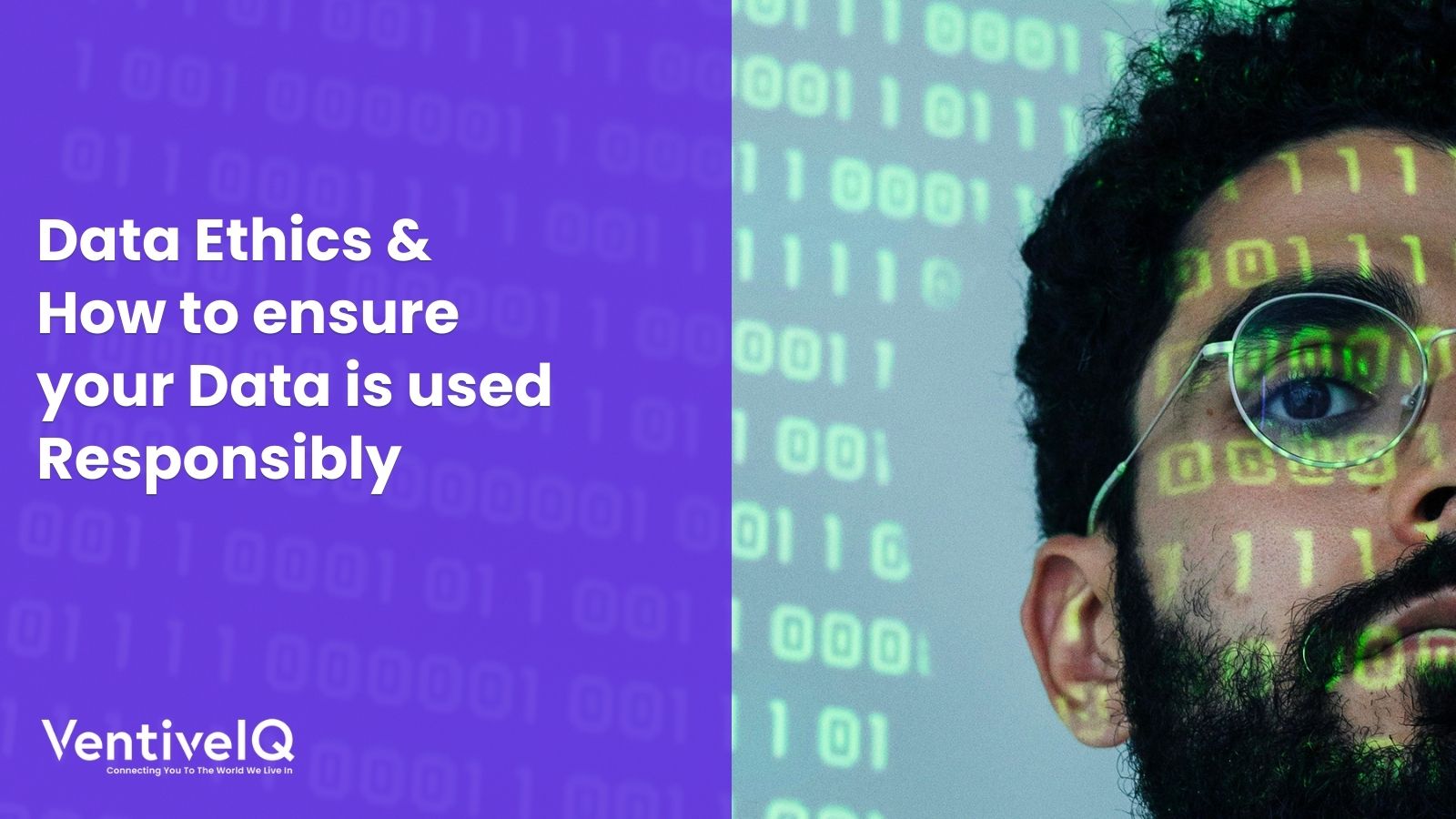Overview
In the United States, data is a valuable commodity. It is used by businesses, governments, and individuals to make decisions, provide services, and influence behavior. However, the increasing collection and use of data has also raised concerns about data ethics, particularly in the United States, where data breaches, privacy violations, and misuse of personal information have raised significant alarm. In this blog, VentiveIQ will delve into the realm of data ethics and discuss practical ways to ensure your data is used responsibly.
VentiveIQ is a data analytics and consulting firm that is committed to using data ethically. We believe that data should be used in a way that benefits society and protects the rights of individuals.

5 ethical principles that we follow when using data
- Privacy: We respect the data privacy of individuals and only collect data that is necessary for our purposes. We also take steps to protect the confidentiality of data.
- Transparency: We are transparent about how we collect, responsible data use, and share data. We provide clear and concise privacy policies that explain our data practices.
- Accuracy: We ensure that the data we collect is accurate and up to date. We also take steps to correct any errors in the data.
- Security: We store data securely to protect it from unauthorized access, use, or disclosure.
- Fairness: We use data fairly and impartially. We do not discriminate against individuals based on their personal characteristics.
We believe that these ethical principles are essential for ensuring that data is used responsibly. We are committed to following these principles in our work, and we encourage other organizations to do the same.
How to Ensure Your Data is Used Responsibly
As an individual, there are a number of things you can do to ensure that your data is used responsibly. Here are a few tips:
- Read the privacy policies of the companies and organizations that you interact with. This will give you an understanding of how your data is being collected, used, and shared.
- Be careful about the personal info you share online. Ensure that you only disclose what you feel at ease with others having knowledge of.
- Use strong passwords and security settings on your devices. By doing so, you can enhance the security of your data and prevent unauthorized access.
- Be aware of the risks of data collection and use. There are a number of ways that your data can be collected and used without your knowledge or consent.
Read more regarding Leveraging First-Party Data: Marketing’s Key Ingredient – an informative blog by VentiveIQ

Understanding Data Ethics
Data ethics refers to the moral principles and guidelines that govern the collection, storage, analysis, and usage of data. It involves considering the rights, privacy, and consent of individuals whose data is being collected, while also balancing the benefits and risks associated with data-driven practices.
Importance of Data Ethics
- Privacy Protection: Data ethics ensures the protection of personal information, preventing unauthorized access, misuse, or disclosure of sensitive data. Respecting privacy rights builds trust between organizations and individuals.
- Avoiding Bias and Discrimination: Data-driven decisions can inadvertently perpetuate biases and discrimination if not carefully managed. Ethical practices aim to identify and rectify such biases, promoting fairness and equality.
- Building Trust: When organizations uphold strong data ethics, they inspire trust among customers, employees, and the public. Trust is crucial for long-term relationships and successful business operations.
The Future of Data Ethics
- The field of data ethics is still relatively new, but it is rapidly evolving. As the collection and use of data continue to grow, so will the need for ethical guidelines.
- Over time, there will likely be a rise in the implementation of additional regulations and standards concerning data ethics. We may also see the development of new technologies that help to protect privacy and ensure that data is used responsibly.
- The future of data ethics is uncertain, but one thing is for sure: it is an important issue that will need to be addressed in the years to come.

4 additional tips for ensuring that your data is used responsibly
- Be aware of the data collection practices of the apps and websites that you use. Many apps and websites collect data about your online activity, even if you do not create an account.
- Use ad blockers and tracking protection tools to reduce the amount of data that is collected about you.
- Be careful about what info you share on social media. Once you posted, removing it can be challenging.
- Be skeptical when encountering offers that appear too good to be true. These offers may be a way for companies to collect your data.
VentiveIQ’s Commitment to Data Ethics
VentiveIQ is committed to using data ethically. We believe that data should be used in a way that benefits society and protects the rights of individuals. We follow the ethical principles outlined above, and we are always looking for ways to improve our data practices.
We believe that data ethics is an important issue, and we are committed to being a leader in this field. We encourage other organizations to follow our lead and use data in a responsible way.
Conclusion
As data becomes increasingly pervasive in our lives, it is crucial to prioritize data ethics to protect individuals’ rights and privacy. By embracing transparent practices, minimizing data collection, implementing robust security measures, and educating employees, organizations can ensure responsible data usage. Striving for ethical standards fosters trust, protects privacy, and promotes fairness and equality. By adopting these principles, organizations in the United States can lead the way toward a data-driven future that respects and safeguards the well-being of individuals and society.
